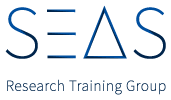SEAS
SEAS
H1 Impact of using Autonomous Lifesupporting Systems in Ambulant Intensive Care on the Social System Family
H1 investigates the implementation and acceptance of autonomous life-supporting systems in ambulant intensive care in the family system. Due to innovations in technical development and the demographic change life-supporting systems and homecare gains more and more importance. Development processes of medical devices (the focus is on artificial respiratory systems and parenteral nutrition systems) are nowadays mainly focused on the reliable and safe support of physical functions of the patient. In this regard, autonomy for the patient as well as for other family members plays an essential role. According to the “Uncanny Valley Effect” (Mori et al. 2012) the acceptance of, respectively, the trust in technical systems increases not linear with the alikeness to healthy people, but falls down to a valley by human similarity: High-maintenance patients who are artificially extended by life-supporting systems become more machine-like (visible hoses, cabling, masks, technical sounds by pumps, but also limited and unnatural mobility by systems) and would fall into the Uncanny Valley by this theory, so that disturbances of familiarity with relatives could be expected. At this point it remains unclear which dimensions of technical realization of autonomously life-supporting systems can be implemented in the familial context and how it changes family dynamics.



